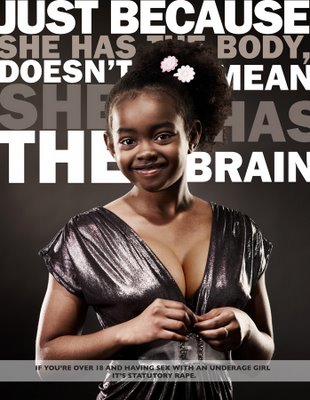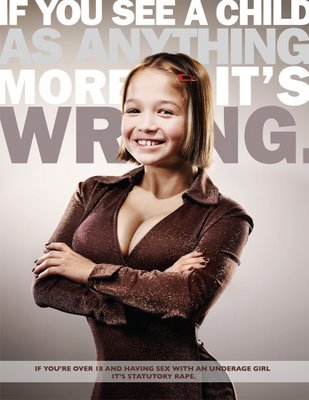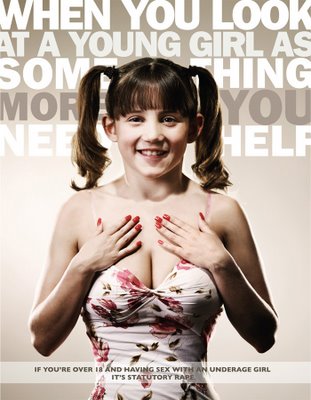A commercial, this one French, to go with our most recent condom ads.This was a tip from an Anonymous commenter.
Lisa Wade, PhD is an Associate Professor at Tulane University. She is the author of American Hookup, a book about college sexual culture; a textbook about gender; and a forthcoming introductory text: Terrible Magnificent Sociology. You can follow her on Twitter and Instagram.Rolling Stone cover (April 2007) advertising the movie Grindhouse.
I don’t have kids, but I am made to understand that childen both are and aren’t a screaming burden. In any case, these ads draw on the idea that kids are a drag, instead of a blessing. This points to contemporary contestation over the meaning of children and their role in our lives, in addition to historical change in the relationship between adults and children (i.e., this compared to the pre-industrial role of children as family labor).
This commercial affirms the notion that only women can be expected to do housework because children and husbands are absolutely useless.
[youtube]https://www.youtube.com/watch?v=4fwTtJZ6Db4[/youtube]
I find the wife’s acceptance of her husbands ass-ish behavior (still her “best friend”) particularly disheartening.
Lisa Wade, PhD is an Associate Professor at Tulane University. She is the author of American Hookup, a book about college sexual culture; a textbook about gender; and a forthcoming introductory text: Terrible Magnificent Sociology. You can follow her on Twitter and Instagram.Today Gwen and I went to the by now well-known Bodies exhibit that displays preserved human cadavers, purportedly so we can learn more about the human body (and give up smoking).
As we went in we joked about how there probably wouldn’t be any female bodies until the part on reproduction. We were royally pissed off to discover that we were right. This is a great illustration of the way in which men are neutral and women deviants from the standard (that is, men are people and women are women). The first 8 or so bodies were all male and all in action doing masculine things.
The first female body we encountered (there were only two out of more than a dozen) stood immediately outside the fetal development hall and alongside the dissections of the genitals and reproductive organs.* Not only was this the first female, she was arranged not in action, but in a pose for the male gaze. She was standing with her hands on her hips, with her breasts and hips thrust forward, and on her tip toes as if she were wearing high heels. We couldn’t find any pictures of her on the web (and we weren’t allowed to take any), but we did find an image of a female cadaver from another exhibit. She was both pregnant (fulfilling her biological destiny) and positioned like a pin up (fulfilling her role as sexual object for men). So, in addition to marginalizing the female body, they gendered both male and female bodies. Male bodies are on the move, but female bodies are good for only two things: babies and sexual provocation.
The last body (male) had a sign over it that said “Your Body” because, of course, the male body is just the neutral human body that represents us all.
* As we entered the fetal development hall there was a sign that warned people that they should take a second and think about whether they wanted to see the fetuses, while assuring us that all of them died of natural causes (that is, not abortion). I think it’s bizarre that we’re supposed to find these fetal bodies disturbing, but not the bodies of people who lived lives and loved others and were loved and all that good stuff. There is something weird about the priorities here, as if the fetuses were somehow more human than the adults. Also, while we were looking at the deformed fetuses, a woman standing next to us said that all teenagers should have to see the deformed fetuses because “that’s what gonna happen” if they start having sex.
Lisa Wade, PhD is an Associate Professor at Tulane University. She is the author of American Hookup, a book about college sexual culture; a textbook about gender; and a forthcoming introductory text: Terrible Magnificent Sociology. You can follow her on Twitter and Instagram.These anti-statutory rape PSAs were made by advertising agency Serve for the United Way of Milwaukee. They created enough of a controversy that they were pulled (see an article at Salon).


In response to the controversy, the advertising agency put a little over 2 minutes of focus group footage on youtube:[youtube]http://www.youtube.com/watch?v=61-gu2X_57k[/youtube]
First, defining our terms:
Income is the money in your paycheck. It’s what you make from your job. Wealth, in contrast, is everything else. It includes stocks and bonds, home equity, other properties, investments, your retirement funds etc. Importantly, you can inherit wealth directly, but you cannot inherit income directly (most of the time).
The relationship between IQ and income is somewhat correlated; in general, people with higher IQs make more money:
But the relationship between IQ and wealth is all over the map:
 This suggests that there is some meritocracy in the distribution of income, not so much in who owns yachts and has deep investment portfolios.
This suggests that there is some meritocracy in the distribution of income, not so much in who owns yachts and has deep investment portfolios.
———————————–
From Zagorsky, Jay. 2007. Do you have to be smart to be rich? The impact of IQ on wealth, income and financial distress. Intelligence 35: 489-501.
Thanks to Conrad H.






